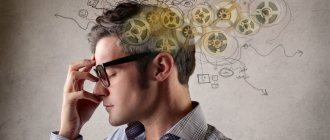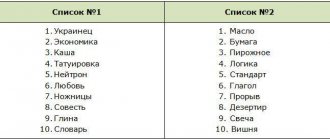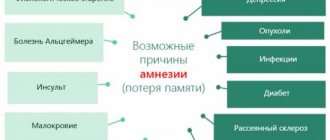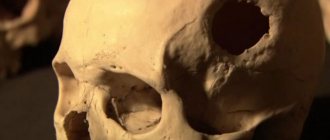June 23, 2020 Beauty and health Admin
It has long been no secret that people over 50 can and should live just as fully as after 30.
Yes, there are certain difficulties associated with the natural aging of the body, but it is quite possible to cope with this if you make some efforts and do not give up.
In this material we will focus on such a common problem as deteriorating memory after fifty years. This problem is becoming more and more relevant in the modern world, because there is too much information, and it is necessary to remember it somehow. Well, let's deal with the problem and find solutions to overcome it.
Lifestyle
The most important thing that prevents you from retaining memory after 50 years is lifestyle. With its normalization, a person will have every chance of not only avoiding memory loss, but even improving it. First of all, you should pay attention to the amount of sleep and bad habits.
Older people need good rest. If young people can work all day without breaks, and then sleep for 4 hours and go back to work, then those who are already over 50 are not subject to such a regime. With any brain activity, pensioners need to rest every half hour, as well as ensure long sleep at night. You need to sleep from 7 to 9 hours, while trying to go to bed before midnight.
Drinking alcohol or smoking are the main enemies of health. They cause enormous harm to the quality of intelligence and memory. The reason for these consequences is the negative effect on blood vessels, which leads to a lack of oxygen in the brain. If you abuse such bad habits, you can face serious illnesses.
Before going to bed, it is recommended to remember all the events that happened during the day. This is a good way to easily develop memory.
Constant supply of fuel - glucose and oxygen
The brain is a very energy-intensive organ; it consumes about 25% of the energy entering the body. Thinking, remembering and concentrating require a lot of calories, which must come from the right foods. Necessary for the functioning of the brain is glucose - the only source of energy for the central nervous system and oxygen, which allows it to be burned. Research shows that the adult brain consumes about 140 grams of glucose every day. The main source of this ingredient is carbohydrates, which you must provide to your body in suitable quantities daily. Let your brain work efficiently throughout the day by eating regularly every 3-4 hours. This prevents blood glucose levels from falling. Don't leave home without breakfast!
Exercise stress
Even the lightest physical exercise improves the quality of blood circulation, which is very important for the brain. It is enough to do simple exercises several times a day to improve your health. Any load is beneficial.
Regularly stretching, walking in the fresh air, and doing exercises are the most important components of the day for those who are thinking about how to train their memory after 50 years. In winter, you can practice Nordic walking and skiing. If a person is in good shape, then ice skating or other active sports are allowed. However, for those who are used to staying at home, it is not recommended to start with skates, because... for them it is fraught with injury. If an elderly person has a summer house, then working in the garden will be the best way to exercise his body.
Why does memory deteriorate after 60 years?
Among the simple but very effective exercises for memory development are the following:
- Remember synonyms for different words.
- Before going to bed, remember the past day, recalling the smallest details.
- Play words
- Actualize various sensations, for example, concentrate on the tactile sense or hearing or olfactory impressions.
- Write down your plans for the day and try to reproduce x in your memory without looking at the list.
- From time to time, do your usual tasks not with your right hand (for right-handers), but with your left hand.
- Doing something in an unusual, new way. For example, change the route of your daily walks.
- Train your visual memory by reproducing the room's decor and landscapes before your mind's eye.
There are many ways to keep your memory in good condition. The best nursing homes offer their guests the opportunity to develop memory by organizing holidays and performances, holding various events that help maintain mental activity for many years. If you want to be active and active even in old age, remember that a lot depends on you and your motivation and determination.
The main receptors with which we sense the world around us are located in our hands. Therefore, in exercises to synchronize the brain hemispheres, the hands will be involved first. Let's look at three exercises that are beneficial for the human brain:
- At the beginning, you should warm up your hands by rubbing your palms together. With your fingers spread out, touch the little finger of your right hand with the thumb of your left hand. With the thumb of your right hand, touch the little finger of your left hand. Now, move the thumb of your left hand to the tip of the ring finger of your right hand. Move the thumb of your right hand to the ring finger of your left hand. Then touch the middle finger of your right hand with the thumb of your left hand. With the thumb of your right hand, touch the middle finger of your left hand. The left thumb should now touch the right index finger. And the big right one is the left index. Everything can be repeated in reverse order, and then several more times, walking from the first toe to the last.
- The brain exercise continues. The second exercise is very simple. With your left hand, grab the tip of your nose. At the same time, hold your left earlobe with your right hand. Now quickly switch hands. The right hand holds the tip of the nose, the left hand holds the lobe of the right ear. Repeat changing hands several times.
- How to make the brain work equally well in both hemispheres? Do the third easy brain exercise. Take yourself with your right hand on your left earlobe, and with your left hand on your right earlobe. Holding your earlobes, squat at least 21 times. Bending your legs, inhale air, straightening your legs, exhale.
Repeat these three exercises every morning. It won't take you more than 10 minutes. But such a brain warm-up will help you synchronize both hemispheres. You will simply become a “terminator”.
The development of the brain hemispheres gives a person the opportunity to solve complex problems faster than others, 5 and even 10 times. How to develop the right hemisphere? We learn from psychologists:
- The first exercise is called “The General’s Greeting.” They salute with their right hand, as they do in the army. At the same time, show a sign of approval with your left hand. Thumb up, clenching the remaining fingers into a fist. The left arm is extended forward. Now you need to quickly change hands, salute with your left hand, extend your right hand forward, finger up. Swap hands several times.
- The second exercise is called: “Mushroom and glade.” The left palm is clenched in a fist, the elbow is on the back of the outstretched palm of the right hand. The right hand is positioned horizontally, at chest level. The left one is perpendicular to the top, the palm clenched into a fist, looking into your face. Swap your hands several times.
- The last movements are more like a tease or a joke. One hand calls out to the viewer, the other hand shows approval: thumb up, fist clenched. Now clap both hands, palm to palm, and switch hands. Show your approval with your other hands. Then again there is a clap and the figures change places. Repeat several times.
Gymnastics for cerebral vessels is needed if a person is diagnosed with vegetative-vascular dystonia. When blood circulation is impaired, the brain experiences oxygen starvation and becomes unable to work actively and correctly.
Dancing, yoga, the Nishi technique, simple movements with the arms, head, and legs help strengthen blood vessels, deliver more oxygen to the brain, and normalize blood circulation.
Light vibration immediately after waking up, without getting out of bed, expands capillaries and removes toxins from the body. To do this, you need to lie on your back, raise your legs and arms straight up, and shake them vigorously for about 5 minutes. The nerves that stimulate the brain are activated.
Waves with the whole body, as a swimming fish does, also perfectly activate blood movement. Sitting down, turn your head in both directions, alternately. Stand up and wave your arms and legs. Exercises for blood vessels are any movements: arms up, down, swinging your arms clasped together, as if chopping wood, increases the flow of blood to the head.
Walking, running, jumping rope, and dancing are useful for strengthening the blood vessels in the head.
Drawing irregular patterns, solving puzzles and puzzles, dividing a complex picture into simple parts are wonderful exercises for developing visual memory.
The Chinese, in order to quickly remember the spelling of a hieroglyph, divide it into several parts. It is easier to remember individual parts. Mentally putting them together, you get the overall picture. So it’s easier to remember a stranger’s appearance if you remember the color of his jacket, shirt, jeans and shoes.
Visual memories become stronger if they are complemented by color, smell, and the melody that sounded at that moment. Remembering a beautiful pear, you will involuntarily feel its taste.
Comparing pictures that are slightly different from each other trains attention to detail and strengthens visual images.
The brain needs to be trained at a very young age. When a child assembles a pyramid of rings, having repeated the construction of this structure several times, he will soon remember that first he must put the largest donut on the pin, then smaller ones, and the smallest ones on top. A cone or asterisk is installed on the top.
It's very fun to imitate the gait of a bear, hit yourself on the forehead and stamp your foot in the right place. These simple manipulations add visual and motor memory to auditory memory.
Fairy tales with frequent repetitions: “A mouse for a cat, a cat for a bug, a bug for a granddaughter, a granddaughter for a grandmother, a grandmother for a grandfather, a grandfather for a turnip,” develop auditory and visual memory, if you look at a colorful book with pictures.
Compiling pictures from puzzles develops attention to detail and visual memory. The child constantly has to compare a piece of the drawing with the general image.
To prevent a teenager’s memory from being overloaded, he needs to develop attention. Exercises for developing attention and memory in schoolchildren are, in principle, performed daily. Actually, studying a new variety of material, repeated in the evening, in homework.
Maps for geography, diagrams for mathematics, drawings for geometry, drawings and photographs for botany, laboratory work in physics help supplement memory. This is how auditory, visual and motor memory works during laboratory work.
By the way, when preparing for exams, a short entry in the form of a cheat sheet is very helpful. It highlights the main points and divides the information into easy-to-remember parts. It's best not to take the "spur" with you to the exam, but writing it up and rereading it before the exam will definitely help you remember the information.
A student should not be overtired. After half an hour of doing homework, you should get up and do exercises for 5-15 minutes and drink a glass of juice, eat an apple, and ventilate the room.
Classes to improve memory in adults are not such a difficult task. If you wish, you don’t have to waste extra time on training attention in adults. Listen carefully to your friend, trying to remember the color of his shirt, shoes, coat, eyes, hair. After you part, try to remember these colors.
While walking down the street, try to remember the numbers of buses or cars passing by. If you are stuck in a traffic jam or have a long ride on a trolleybus, solve crosswords and scanwords. They perfectly train memory and attention.
Memorize three words of a foreign language every day. Learn poetry, read at least 20 pages a day. These simple ways train the brain and memory of busy adults.
Try not to overwork and eat right. Fresh fruits and vegetables, greens, a lean diet, enough calories, a varied menu are necessary to nourish brain cells.
Brain exercises for older people are quite simple. Read fairy tales and retell them to your beloved grandchildren, memorize with them children's funny poems about “The Absent-Minded One from Basseynaya Street.” It's fun and enjoyable, and it also preserves your personality.
Intelligence training prevents a person from losing his skills and knowledge. It's not just our muscles that need warming up. Neurons restore their connections and do not die if the brain is loaded with feasible work.
You shouldn’t get too tired, but collecting pictures from puzzles, learning foreign words, walking in the park along an unfamiliar alley, remembering a new route, is necessary for good attention. Doctors recommend brushing your teeth and combing your hair either with your left hand or with your right. Simple experiments, but effective.
Good nutrition and fresh air will be the best helpers for you and your mind. Individuals who lead an active lifestyle do not suffer from senile dementia.
What is neurobics - brain gymnastics. It helps synthesize new connections between neurons in the brain and preserves good memory for a long time. It is useful for people at any age: schoolchildren and the elderly for mental correction.
Glycine
Morning exercises
A special set of exercises for morning exercises will help improve blood circulation, which will have a positive effect on the quality of memory. You need to do it every day, without missing a single day. It perfectly complements classical exercises, and you should do gymnastics first while lying in bed. First you need to rub your palms against each other to warm up and activate the body.
Some interesting exercises:
- Slowly bring your hands to your face and lightly rub under your eyes with your thumb knuckles.
- Extend your palm with your thumb extended. Stroke the front of the neck with rubbing movements.
- Grasp the lower part of the chin with your thumbs and rub your cheeks with your palms.
Similar rubbing actions should be repeated for all parts of the head, shoulders and arms. You can use not only your palms, but also your fingertips.
How to improve memory quickly. Additional "anchors"
The Indians of North America used this method to remember important events: as soon as something happened that they wanted to forever imprint in their memory, they took out and uncorked one of the bags with an aromatic mixture. And from that moment on, every time they inhaled this smell, they recalled the event in detail.
How to improve memory if we don’t carry such bags with us? Establish associative connections using other senses: touch, taste, vision. Touch the fabric to remember how it feels under your hands, and this will help you remember the color; put lemon caramel in your mouth when you meet a person, and you will remember his name, feeling that taste on your tongue again.
- Repetition is the best exercise
To improve memory and attention, scientists recommend the following scheme for repeating information:
- Re-read the text a second time immediately after the first reading;
- Do this again after half an hour;
- The next reading must be repeated after 8 hours;
- After a day, read the material again.
It is advisable to repeat such exercises for long-term memory improvement after two weeks, and the last time after two months.
- The brain remembers what it is working on
How to improve memory quickly and without a lot of time? It may not need to be improved; the problem may lie in the habit of mindlessly memorizing information instead of comprehending it.
The human brain is designed in such a way that it is difficult for it to solidify an order of words that is meaningless from its point of view without understanding what exactly stands behind these words. In the case when we understand what the text is about, we just need to understand the essence of the question, and the rest will emerge in our heads on its own.
The habit of first understanding and then memorizing gives an excellent chance of significantly improving memory, increasing attention.
- Speaking out loud
As a good exercise to improve memory, you can use the method of speaking the material you are reading out loud.
This allows you to use not only visual, but also auditory memory, which increases the chances of memorization and generally improves memory. How to quickly improve memory if simple speaking does not help? Try singing what you are trying to remember. Sing the lyrics to the tune of a famous hit or create your own melody using the phenomenon of a song that you can't get out of your head.
- Data recovery
In one of the stories about Sherlock Holmes, the great detective asked his assistant how many steps on the stairs he climbed every day, and Dr. Watson could not give an answer.
Often we do not notice the most obvious facts and figures that are repeated over and over again, and as another exercise to improve memory, we should use the method of reconstructing past events.
Have a free minute at work? Close your eyes and try to restore the appearance of the colleague you met in the hallway yesterday. Remember what he was wearing, what he said, what his facial expression was. This method is great for those who have problems with visual memory and cannot remember faces in their heads, although they are not inclined to forget names.
Using the same exercise to improve memory, you can learn to remember the sequence of events - a few days after going to the cinema, try to remember in detail how many people were in the hall, what you ate and drank, do the same after visits to a museum or restaurant. And soon you will notice that memory problems begin to recede.
Hobby
You can improve memory and brain function in old age with the help of a hobby. They can be very different. It all depends on personal interests and capabilities. Some people prefer something serious:
- Studying foreign languages;
- Learning to play musical instruments;
- Classes with equipment or modern technologies.
For most older people this is very difficult. Therefore, it is recommended to give preference to simpler options: crosswords, Sudoku, puzzles, puzzles, chess, dominoes. If you have the opportunity to use a computer or smartphone, then some computer or mobile games aimed at strengthening memory and developing intelligence will be useful.
The best option is to read literature. In the process of reading a book, the parts of the brain responsible for the quality of thinking and memory are activated. However, it will be possible to increase the level of memorization only with a thorough analysis of what you read. Reading books quickly will not produce much results. Additionally, you can learn poetry, which will also bring certain results.
Our grandfather sings in the choir
Music lessons help keep your memory in good condition. With the help of such activities, you can improve your brain function almost effortlessly. Moreover, they are also preventive and calming in nature.
Sing karaoke. Join the choir. Buy a guitar and learn to play it. Rehearsals, memorizing lyrics and chords, notation - all this will have a beneficial effect on the state of your memory.
Exercises
The best way to strengthen your memory is to approach the issue comprehensively. After creating all the conditions to improve it, you need to use special exercises. The following exercises will help preserve your memory in old age:
- Try to remember people in a store or on a bus. The task is to remember their faces and clothes after an hour, describing their appearance in as much detail as possible.
- Count backwards. It is recommended to start with 300, gradually counting to 1.
- Write down 20 words on a piece of paper. Try to remember them in 30 seconds. Turn away and write them all on a blank piece of paper.
There are other exercises that help improve memory quality. You can even come up with them yourself, based on famous puzzles.
There is a special mnemonics. It involves creating analogies, which helps to remember important information and strengthen memory. You can: shorten phrases to the first letters, figuratively visualize thoughts, come up with rhymes, break information into parts.
Synchronized writing
The exercise trains brain functions by strengthening interhemispheric connections, involving in the work of those neurons that are not active under normal conditions. To perform, you need a sheet of paper divided into two parts and two writing instruments. The essence is to simultaneously depict identical objects with different hands: geometric shapes, letters, numbers and even words.
Nutrition
With poor nutrition, an unhealthy lifestyle and lack of brain activity, there is a risk of losing memory altogether. But if a person tries to live correctly, loading the brain and body, and also eats well, then there will be no problems with remembering information. It is necessary that the diet includes all essential vitamins (B1, B2, B3, B6, B12, C, E, D). How to strengthen memory in old age with food, what to eat:
- Fish (salmon), fish oil;
- Meat (chicken, turkey);
- Walnuts, pumpkin seeds;
- Chicken eggs;
- Groats (buckwheat), grains, bran;
- Milk, cottage cheese, kefir;
- Tomatoes, cucumbers, carrots, cabbage;
- Blueberries, prunes;
- Ginger, figs, cinnamon, pepper, cloves.
If you constantly eat healthy foods, repeat memory development exercises, and be physically active, this will be enough to preserve your brain. The aging process will slow down significantly.
Stick to a diet
- Cut down on refined carbohydrates. The body quickly digests baked goods, candy, carbonated drinks, white rice, etc. This leads to a sharp increase in blood sugar, causes obesity, dementia, and reduces cognitive function.
- Eat more fish. Fish oil is a source of omega-3 acids, which are beneficial for brain function.
- Include seafood, nuts, and grains in your diet. They contain a lot of fatty acids and microelements.
- Eat more vegetables, fruits, berries. The body needs fiber and vitamins, and antioxidants protect brain cells from damage and support mental activity.
- Avoid saturated fats (red meat, whole milk, butter, cheese, cream, ice cream). Increase the risk of developing dementia, reduce concentration and memory.
- Drink green tea. Contains antioxidants that protect brain cells, improve memory, and slow down aging.
- Love turmeric , which reduces inflammation and amyloid plaques in the brain.
- Drink cocoa. The drink improves memory performance. Choose 70% dark chocolate to get your antioxidant dose.
Medicines
Regular improvement is not enough. In some cases, taking medications is simply necessary. However, before purchasing any medications, you should consult your doctor, because... sometimes there is no need to take them.
Doctors recommend giving preference to dietary supplements with the addition of ginseng, which is very useful for maintaining strong memory in older people. The most popular is “Vision”, which is suitable for people of any age. You can also purchase:
- Biotredin. Affects the nervous system, improves memory, relieves stress.
- Vitrum Memory. The tablets strengthen memory, improve vision and hearing.
- Piracetam. A psychostimulant classified as a nootropic, it helps preserve memory. Do not use if you have kidney problems.
- Phenotropil. Tablets that increase alertness and performance; tone the body, improve memory.
- Glycine. A simple drug that improves brain activity naturally, normalizes sleep and mental health.
Modern medicine makes it possible to regain memory very quickly. However, treatment must be prescribed by a doctor. It is highly not recommended to choose medications on your own.
Only Glycine or vitamin complexes can be taken safely without consulting a doctor.
What memory enhancing drugs can older people take?
Glycine
This remedy has been known since Soviet times. It is used to improve memory in elderly people who suffer from amnesia and sclerosis. The drug improves and regulates metabolism, increases performance, relieves stress, anxiety, and eliminates insomnia.
Glycine can also be prescribed to a person at a young age if he has suffered an injury, brain contusion, or concussion. If you suffer from nervous exhaustion and emotional fatigue, then this drug will help get rid of these unpleasant phenomena. Glycine has no contraindications for use, however, individual intolerance to one of the components in its composition is possible. Drugs that improve brain function and memory, such as glycine, in rare cases cause an allergic reaction, drowsiness and a feeling of “tinnitus”.
Intellan
Intellan stimulates brain activity. It is prescribed for severe stress, depression, problems with concentration and attention. The drug helps improve memory in older people, but is sometimes prescribed to children if their development is slow. By the way, the medicine should not be taken at night due to the risk of insomnia.
Piracetam and phenotropil
The drugs piracetam and phenotropil, which improve blood circulation and activate metabolic processes, help older people improve their memory. Piracetam is used not only to improve memory. It is prescribed for diseases of the nervous system, atherosclerosis, and injuries. It can only be taken as prescribed by a doctor, as it is possible that allergic reactions and exacerbations of heart disease may occur. The medicine is available in ampoules, capsules, granules, and tablets.
Phenotropil produces a psychostimulating effect. It helps improve memory and concentration, and should be taken in the first half of the day. Like other medications that improve memory, phenotropil can cause side effects, for example, high blood pressure and insomnia.
Tanakan and phenibut
Tanakan and Phenibut are prescribed to adults if they need to improve their memory. Tanakan is prescribed for encephalopathy and mental impairment. Phenibut is recommended if the patient is worried about anxiety and irritability. Like other pills that improve memory, they can cause side effects, for example, dizziness, itching, etc. These medications are contraindicated for gastritis, ulcers, and circulatory problems.
Traditional methods
It will also be possible to improve memory at home using traditional methods. The result will be noticeable within a few weeks of taking this or that product. How to improve memory after 60 years:
- Infusion of pine buds. Pour boiling water (200 ml) over the kidneys (2 tsp), put on fire for 10 minutes, cool and strain. Take 2 tsp after meals. Particularly effective after a stroke.
- Garlic tincture. Chop the head of garlic, add oil (200 ml), leave for 3 weeks, and then strain. You need to take 1 tsp before meals.
- Clover tincture. Pour vodka (500 ml) over the clover flower heads and leave for 2 weeks. Take 1 tbsp. l. before bed every day for 3 months.
- A mixture of lemon, horseradish and honey. Grate horseradish (100 g), lemons (3 pcs.), add honey (3 tbsp.), put in the refrigerator for 3 weeks. Take with meals 2 mornings and evenings.
- Sage tincture. Pour boiling water (200 ml) over chopped sage leaves (2 tablespoons), wrap in a towel for 20 minutes. Take 2 tbsp. l. half an hour before meals in the morning and evening.
You should use tinctures or other folk remedies for no longer than three months, after which you need to take a break for about three weeks. Some herbs may have contraindications, which is why you need to consult a doctor in advance to eliminate possible risks.
Fine motor skills training
Physical activity directly affects cognitive function. This process is especially pronounced at the birth of a child, when through movement the development of brain connections and acquaintance with the outside world occurs. Thanks to this direct relationship, one of the areas of rehabilitation after a stroke is the restoration of hand movement, which then accelerates the return of cognitive functions: memory, attention and others.
Basic capabilities of working with your hands:
- exercises for the hand and individual fingers: kneading joints, rolling balls, sorting through sand;
- modeling from various materials: clay, plasticine, dough;
- creative activities: drawing, needlework (knitting, embroidery);
- collecting puzzles.
How to improve a teenager's memory. How to develop memory in a teenager
If a teenager has poor memory, it is necessary to exclude a neurological cause for this deficiency. To do this, you need to visit a doctor, otherwise any measures can only do harm. If there are no medical reasons for this, then you will have to make a lot of effort to develop memory.
Instructions
1
One of the best ways is to memorize poetry and prose. Start with small poems or passages, gradually increasing the size of the text and making it more complex. Prose is more difficult to learn, so it is worth moving on to it when the teenager has already mastered poetry. It is necessary to check how long what you have learned remains in your memory. Does he remember two days later? And in a week? And in a month?
2
Two more ways to develop memory are traditional school presentation and retelling. Let the teenager retell to you an article he read or a chapter from a book, close to the text. Or he will write a presentation, trying to use as much vocabulary from the text as possible and respecting its structure. If you do this regularly, not only your memory will improve, but also your speech.
3
In addition to these traditional ones, there are also special exercises for the development of memory, both visual and auditory. For example, say any 10 words that are not logically related to each other and ask the teenager to repeat everything he remembers.
4
To train your auditory mechanical memory, say 10 three-digit numbers quickly. The teenager must repeat them. In this, as in the previous exercise, 6 reproduced words or numbers are considered the norm.
Helpful advice
Now there are no problems with materials and aids for memory development - neither online nor in bookstores. If you are not confident in your abilities, you can turn to specialists - psychologists and teachers.









